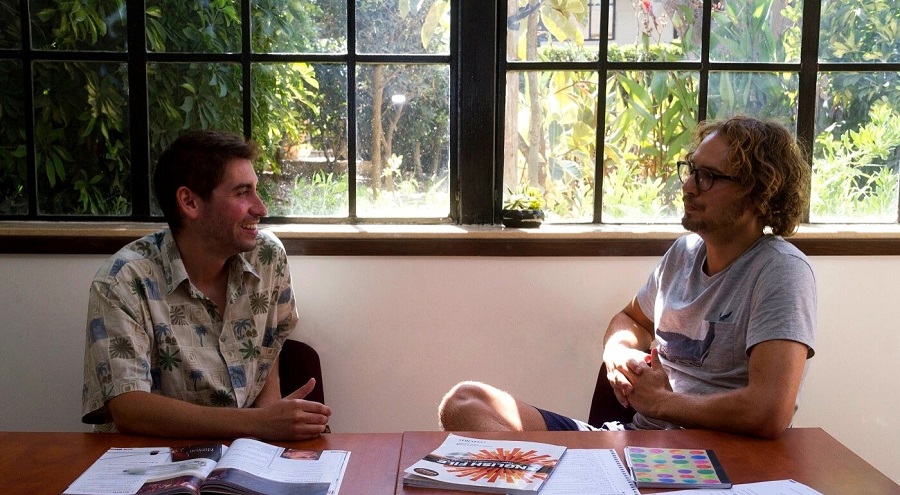How to Learn English by watching Movies and Series
Everyone talks about learning English with movies, but it requires more effort than passively watching a movie. Our guide will explore the art of blending entertainment with education, and provide you with effective techniques, recommended films, and actionable tips.

A professional Guide to Learning English with Movies
It is typical for second-language speakers to learn English through movies and TV shows. Is this really an effective technique to acquire a new language? There are many ways to learn a language, starting from textbooks to living in an environment of the target language. Reading books and listening to the language might also help you with learning. As part of the language acquisition process, watching movies gives a window into real-world language usage. In movies, language is alive and current. This is a huge benefit especially if you’re not in an English-speaking environment. When done correctly, watching English movies may actually help you learn more.
How can watching movies help you learn English?
1. Seeing the language used in a natural way
In our English classrooms, we emphasize learning real-world English and using the language in a natural way. Watching movies in your own time is the perfect way to continue to practice this, especially if you do not live in an English-speaking country. Language is alive and changes depending on the country and culture as well, this allows you to get a real feel of the language and its use in daily life. That includes slang words, trends, and fads of the moment.
2. Learning how people communicate with one another
This point builds up on the first one. While you might be limited to practicing speaking with another person, through movies you can observe how natives interact with one another – whether it’s language, fillers, conversation starters, or how to respond to the news. Movies are supposed to seem real and believable, the dialogue and the used language in them are the closest you will find to the way the locals sits. You don’t learn from a textbook, where there might be more formal phrasing.
3. Learning the metaphorical and colloquial meaning of words
This point is also expanding on the first point. Often in the English language, words have more than one meaning – a literal meaning and a metaphorical one. When learning a new language, we usually learn new words relating to topics with a vocabulary list that includes all important words.
If you attend English courses in an English-speaking country, you’ll know that this is not the only way most words can be used. For example, in our classrooms at BELS, we make sure that colloquial English is also learned to equip students to function in the real world. This is not always easy to achieve when learning on your own. By watching movies you can overcome this barrier. Take the word “killer” for example. You might know the word as a synonym for “murderer”, but did you know that it can also mean that you think something or someone is very cool? “Wow, your new shoes are killer, Maggie!”. These are things that you pick up while enjoying a movie.
4. Focusing on words related to a specific topic or profession
When you need to learn English based on a specific purpose or profession, it’s difficult to come across situations in daily life that allows you to see the language used naturally. One way to overcome this is having job shadowing, internships, or work placements. But the second-best way to get some practice is through movies and tv shows. For example, if you’re interested in legal English, watching shows like Suits will give you a feel of how to use the language.
5. Getting the message across with intonation and nonverbal cues
Intonation, facial expressions, and gestures are all as important as pronunciation when it comes to getting a message across. It is not only the words that matter but how you say them with your whole body. While a textbook can teach you the right pronunciation of words, it is best to “see it in action” – movies are perfect for this because you can see their reaction and habits while saying things like “I hate you”. Depending on what word you put your emphasis on it can mean “I HATE you”, emphasising the emotion of hate, or “I hate YOU”, meaning they don’t hate just anyone but you. So, you see, it is important how you say things…
6. It’s fun
Learning with a textbook can sometimes be tiring and feel like time stretches like chewing gum. There’s a limit to how much time you can spend in class or studying. If you watch a movie, which you actually enjoy, the time goes by super-fast and you learn while you watch – perfect, right?
Effective strategies to learn English with movies
Even though watching movies and series is a pastime activity, for learning to occur there needs to be an active effort put in. This is mainly this is to ensure that you are paying attention and absorbing the language. Use our tips below to apply the best techniques.
1. Select a movie corresponding to your language level
It can be very boring when you choose a movie that might be too easy for you, but it can also be very frustrating when you choose a movie that is too hard to understand – you will lose interest and motivation to carry on watching. If you are a beginner, start with children’s movies or shows. They use easy language and simple sentences, so chances are you will understand it easily. If you’re unsure of your level of English, take our free online English test.
2. Choose a movie you are interested in and familiar with
Might sound obvious, but as mentioned before, if you are not interested in the topic you want to learn about, you will probably stop putting in the effort to actually learn. Another great point is to choose a movie you already know and have watched multiple times in your own language. For example, if you’re a die-hard Harry Potter fan, you can watch them in English this time around.
3. Turn on the subtitles
This has two advantages: Firstly, you can read the words you didn’t understand while talking and secondly you will see how the words are written while simultaneously hearing the pronunciation that goes with the word. If you don’t know a word, don’t worry – most of the new words can be figured out through context. And if that doesn’t work either just look the word up in a dictionary.
4. Give yourself a task
When watching a movie, keep in mind that learning requires actively working with the language. In a classroom for example, if you have a video or listening task, the teacher will always give you a set of questions or tasks related to the media beforehand. This ensures that you are actively listening to the media rather than passively – and this is how learning occurs. You can choose a simple task connected to the level and language you are currently learning. For example:
- If you are currently learning adjectives –Write down all adjectives used.
- If you are currently learning about verbs – Write down all the verbs used.
- If you are learning about passive sentence structures – write down all passive sentences you hear.
5. Turn off subtitles
Once you feel confident and that your level of English has improved, the next step is to watch movies as you’d do in your first language. Try turning subtitles off once you feel a bit more confident in your use of the language. Maybe do this with a movie that you have watched before.
Try it yourself – Travel to Malta with BELS English Schools.
Movies can give you a sense of real-world language use, but nothing beats actually speaking the language yourself. Attending an immersive English-speaking course is the best method to get results. This is where BELS can help – we offer trip packages which include English classes, accommodation, and a social package for a complete experience. Write to us at [email protected] to plan your trip.
Learn English under the Sun
Join our English language schools in Malta and Gozo. With over 25 years of experience, we offer the perfect balance between learning and leisure on our stunning islands.
View Offers


